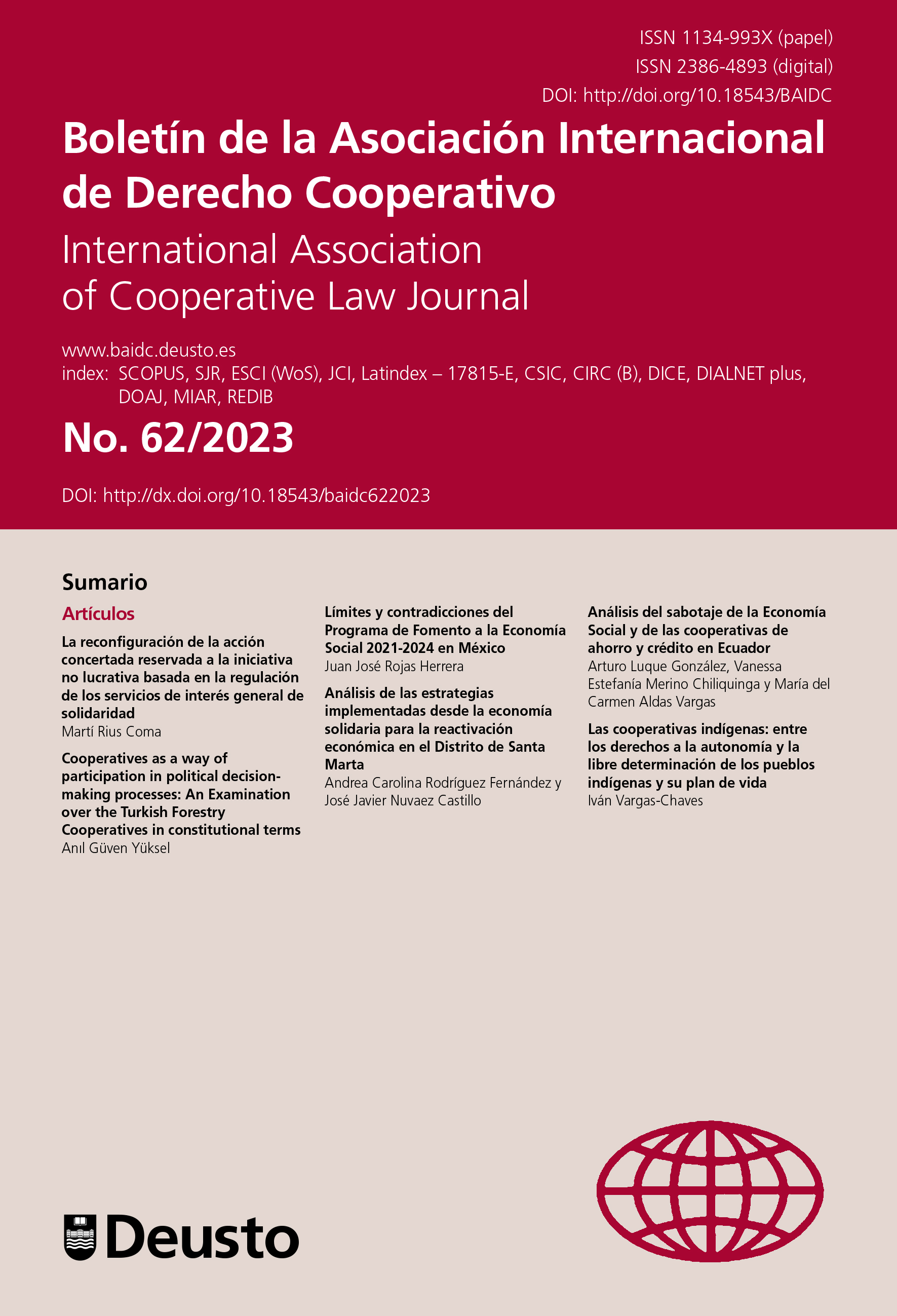Las cooperativas como forma de participación en los procesos de toma de decisiones políticas: un examen de las cooperativas forestales turcas en términos constitucionales
Resumen
En este artículo, las cooperativas fueron examinadas en su estructura distintiva, cuestionando si pueden ser vistas como una forma de participación civil en la toma de decisiones políticas, presentando algunos casos recientes de Cooperativas Forestales Turcas. En primer lugar, se explicó brevemente el lugar de la sociedad civil en las democracias participativas y la importancia de las condiciones económicas y sociales en esta perspectiva; y en consecuencia se mencionó el papel de las cooperativas en la sociedad civil. Posteriormente, se analizó el impacto práctico de la cooperativa en la toma de decisiones políticas a través de la instancia de OR-KOOP, incluyendo información central sobre cooperativas y aldeanos forestales en Turquía, que representan una comunidad con menores facilidades económicas, en la búsqueda de necesidades fundamentales para una participación esperada en procesos de toma de decisiones politicas. Finalmente, se reveló la significación constitucional de los bosques y las cooperativas en relación con los conceptos transversales de democracia participativa, desarrollo sostenible y derechos humanos.
Recibido: 29 julio 2022
Aceptado: 27 abril 2023
Descargas
Citas
AKBARI DOLATABAD, Mohammad, Mohammad SADEGH EBRAHIMI, and Amir MOZAFAR AMINI. 2022. “Pathology of Rural Production Cooperatives- Evidence from Iran”. International Association of Cooperative Law Journal, no. 61 (December), 167-84. https://doi.org/10.18543/baidc.2298.
ATMIS˛, Erdog˘an, H. Batuhan Guns˛en and Sezgin Ozden. 2009. “Forest cooperatives and its importance in rural poverty reduction in Turkey”. XIII World Forestry Congress, Buenos Aires, Argentina, 18-23 October 2009.
BAKIRCI, Fahri. 2015. “Yasama Surecinin Hızlandırılması ve Sakıncaları”. In Kanun Yapma Teknig˘ i, Turkish Bar Association, Ankara. http://tbbyayinlari.barobirlik.org.tr/TBBBooks/545.pdf.
BIRCH, Anthony H. 1993. The Concepts and Theories of Modern Democracy. London: Routledge.
CAG˘LAR, Yucel. 2014. Hukuksal Kıskactaki Ormanlar Ve Ormancılık (Secme Tartıs˛ malar). Ankara: TBB Yayınları. http://tbbyayinlari.barobirlik.org.tr/TBBBooks/488.pdf.
CONSTITUTE. The World’s Constitutions to Read, Search, and Compare. Accessed July 2022. https://www.constituteproject.org/.
COUNCIL OF EUROPE COMMITTEE OF MINISTERS. 2017. Guidelines for Civil Participation in Political Decision making. Council of Europe CM Documents, CM(2017)83-final.
DOUVITSA, Ifigeneia. 2022. “National Constitutions and Cooperatives: An Overview”. In Perspectives on Cooperative Law-Festschrift In Honour of Professor Hagen Henry, edited by Willy Tadjudje and Ifigeneia Douvitsa, 57-62, Singapore: Springer.
EBRAHIMI, Mohammad Sadegh, and Mojtaba Ghaediyan. 2021. “Corporate Social Responsibility and Organizational Commitment in Agricultural Cooperatives: Evidence from Iran”. International Association of Cooperative Law Journal, no. 59 (December), 263-83. https://doi.org/10.18543/baidc-59-2021pp263-283.
ERDONMEZ CIHAN AND AYNUR AYDIN COS˛KUN A. 2003. “Sustainability in Turkish Forest Legislation and Administration”. XII. World Forestry Congress, Quebec, Kanada. http://www.fao.org/3/XII/0072-C1.htm.
FOREST PRINCIPLES-REPORT OF THE UNITED NATIONS CONFERENCE ON ENVIRONMENT AND DEVELOPMENT, Rio de Janeiro, 3-14 June 1992, Annex III, Non-Legally Binding Authoritative Statement of Principles for a Global Consensus on the Management, Conservation and Sustainable Development of All Types of Forests. Accessed July 2022. https://wrm.org.uy/other-relevant-information/forest-principles-report-of-the-united-nationsconference-on-environment-and-development/.
GALLARDO-COBOS, Rosa. 2010. “Rural development in the European Union: the concept and the policy”. Agron. colomb. vol. 28 no. 3, Bogota Sept./ Dec. 2010.
ILO. 2001. Report V (1) (on) Promotion of cooperatives (Decision to revise the Cooperatives (Developing Countries) Recommendation, 1966 (No. 127). Accessed July 2022. https://www.ilo.org/public/english/standards/relm/ilc/ilc89/rep-v-1.htm.
ILO. 2002. Promotion of Cooperatives Recommendation (No: 193). Accessed July 2022. https://www.ilo.org/dyn/normlex/en/f?p=NORMLEXPUB:12100:::NO:12100:P12100_ILO_CODE:R193:NO.
INTERNATIONAL CO-OPERATIVE ALLIANCE (ICA). Accessed July 2022. https://www.ica.coop/en/cooperatives/cooperative-identity.
KARTHIKEYAN, Muthumariappan and R. Karunakaran. 2018. “Cooperatives as Hybrid Approach to pull off Sustainable Development and Livelihoods: An Analytical Review” (January 25, 2018). Accessed July 2022. http://dx.doi.org/10.2139/ssrn.3109324.
KEANE, John. 1988. Democracy and Civil Society. London: Verso.
MEYER, Thomas, and Lewis P. Hinchman. 2002. Media Democracy: How the Media Colonize Politics. Cambridge: Polity Press.
MULAYIM, Ziya Gokalp. 1998. “The Fundamental Problems of Turkish Co-operatives and Proposals for Their Solution”. MEDIT, 4/98, 14-21.
OAKLEY, Pete and Christopher Garforth. 1985. Guide to Extention Training: Food And Agriculture Organızation of the United Nations, Rome. http://www.fao.org/3/t0060e/T0060E00.htm#Contents.
OKAN, Necret Durukan and Cuneyt Okan. 2003. “An Overview of Cooperatives in Turkey”. FAO Regional Office for Europe and Central Asia Policy Studies on Rural Transition No. 2013-3. http://www.fao.org/3/ar427e/ar427e.pdf.
OR-KOOP (Central Union of the Turkish Forestry Cooperatives). Accessed July 2022. http://www.orkoop.org.tr/kurulus3.html. OZDEN, Sezgin and Mehmet Mendes˛. 2005. “The usage of multiple correspondence analysis in rural migration analysis”. NEW MEDIT, 4, 36-41.
REPUBLIC OF TURKEY CONSTITUTIONAL COURT. TURKISH CONSTITUTIONAL COURT JUDGEMENT (Application N. 2018/104), Decision No 2020/39, 16 July 2020. https://www.resmigazete.gov.tr/eskiler/2020/11/20201127-7.pdf.
REPUBLIC OF TURKEY COUNCIL OF STATE, 8th Chamber (App. N. 2015/4565), Decision No 2019/6084, 26 June 2019.
REPUBLIC OF TURKEY COUNCIL OF STATE, 8th Chamber (App. N. 2020/6497), Decision No 2021/1884, 30 March 2021.
REPUBLIC OF TURKEY COUNCIL OF STATE, Plenary Session of Administrative Law Division, (Stay App. No 2016/126), 11 April 2016. (Stay of Execution).
REPUBLIC OF TURKEY COUNCIL OF STATE, Plenary Session of Administrative Law Division, (App. N. 2018/1893), Decision No 2019/3699, 12 September 2019.
REPUBLIC OF TURKEY COUNCIL OF STATE, Plenary Session of Administrative Law Division, (App. N. 2019/3415), Decision No 2021/724, 7 April 2021.
REPUBLIC OF TURKEY COUNCIL OF STATE, Plenary Session of Administrative Law Division, (App. N. 2021/2807), Decision No 2021/3210, 20 December 2021.
REPUBLIC OF TURKEY COUNCIL OF STATE. 8th Chamber (App. N. 2016/14666), Decision No 2018/1116, 28 February 2018.
REPUBLIC OF TURKEY MINISTRY OF CUSTOMS AND TRADE DIRECTORATE GENERAL OF COOPERATIVES. (2012). Turkish Cooperatives Strategy and Action Plan 2012-2016. Accessed July 2022. https://social.un.org/coopsyear/documents/Turkish-cooperatives-action-plan2012.pdf.
REPUBLIC OF TURKEY. Cooperatives Law (N. 1163). (Turkish original) Accessed July 2022. https://www.mevzuat.gov.tr/MevzuatMetin/1.5.1163.pdf.
REPUBLIC OF TURKEY. Forest Law (N. 6831). (Turkish original) Accessed July 2022. https://www.mevzuat.gov.tr/MevzuatMetin/1.3.6831.pdf.
REPUBLIC OF TURKEY. Regulation on Rules and Procedures for Preparing Legislations (4821). Accessed July 2022. https://www.mevzuat.gov.tr/MevzuatMetin/3.5.20059986.pdf.
REPUBLIC OF TURKEY. Regulation on the Principles and Procedures of Selling Forest Products (6377). (Turkish original) Accessed July 2022. https://www.mevzuat.gov.tr/MevzuatMetin/3.5.20157255.pdf.
REPUBLIC OF TURKEY. The Constitution of the Republic Of Turkey. Accessed July 2022. https://global.tbmm.gov.tr/docs/constitution_en.pdf.
SMITH, Stirling. 2014. Promoting cooperatives: An information guide to ILO Recommendation No.193. Geneva: Prodoc.
TARHAN, Mumtaz Derya. 2017. “Renewable Energy Co-operatives and Energy Democracy: A Critical Perspective”. Canadian Association for Studies in Co-operation, 1-26.
UN ECOSOC COMMISSION ON SUSTAINABLE DEVELOPMENT. 2009. “Major groups priorities for action in agriculture, rural development, land, drought, desertification and Africa”. Seventeenth session 4-15 May 2009 (E/CN.17/2009/10).
UN ECOSOC COMMISSION ON SUSTAINABLE DEVELOPMENT. 2009. “Report on the Capacity Development Workshop for Improving Agricultural Productivity, Water-use Efficiency and Rural Livelihoods”. Seventeenth session 4-15 May 2009 (E/CN.17/2009/16).
UN FOREST INSTRUMENT. 2008. Non-legally binding instrument on all types of forests: resolution / adopted by the General Assembly A/RES/70/199. Accessed July 2022. https://www.un.org/esa/forests/documents/un-forest-instrument/index.html.
UN RESOLUTION ADOPTED BY THE GENERAL ASSEMBLY ON 25 SEPTEMBER 2015, “Transforming our world: the 2030 Agenda for Sustainable Development”. Accessed July 2022. https://sdgs.un.org/2030agenda.
UNITED NATIONS COMMISSION ON SUSTAINABLE DEVELOPMENT REPORT. ON THE EIGHTH SESSION (30 April 1999 and 24 April-5 May 2000), Economic and Social Council Official Records, 2000 Supplement No. 9.
VAN DER PLOEG, Jan Douwe, Henk Renting, Gianluca Brunori, Karlheinz Knickel, Joe Mannion and Terry Marsden. (2000). Rural Development : From Practices and Policies towards Theory. Sociologia Ruralis, 40(4), 391- 408. https://doi.org/10.1111/1467-9523.00156
WHITEMAN, Adrian. 2000. “Promoting rural development through forestry policy: some experiences from developing countries”. Presentation to the seminar: The role of forests and forestry in rural development-implications for forest policy: a contribution to the Work of the Ministerial Conference on the Protection of Forests in Europe, 5-7 July 2000, Vienna. Accessed July 2022. http://www.fao.org/3/af302e/af302e.pdf.
WISKERKE, J.S.C., B. B. Bock, M. Stuiver and H. Renting. 2003. “Environmental co-operatives as a new mode of rural governance”. NJAS, 51-1/2.
YUKSEL, Anıl Guven. 2022 (a). Toplumsal Yas˛ama Katılma Hakkı. Istanbul: On Iki Levha Yayıncılık.
YUKSEL, Anıl Guven. 2022 (b). “Cooperatives’ Role on the Socio-Economic Integration of Forcibly Displaced People”. In Las cooperativas como instrumento de politica de empleo ante los nuevos retos del mundo del trabajo, edited by Francesco J. Arrieta Idiakez, Madrid: Dykinson. (to be published within 2022, the reference will be updated accordingly).
ZITTEL, Thomas. 2007. “Participatory Democracy and Political Participation”. In Participatory Democracy and Political Participation, edited by Thomas Zittel and Dieter Fuchs, 9-28, Oxon: Routhledge.
Derechos de autor 2023 Universidad de Deusto

Esta obra está bajo licencia internacional Creative Commons Reconocimiento-NoComercial 4.0.
El/la autor/a, mediante la entrega de sus manuscritos al Boletín de la Asociación Internacional de Derecho Cooperativo (BAIDC), acepta las condiciones que se detallan a continuación sobre derechos de autor/a y se compromete a cumplirlas.
1. Cesión de derechos
La Editorial (Universidad de Deusto) conserva los derechos de autor/a de esta publicación.
Mediante la entrega de sus manuscritos al Boletín de la Asociación Internacional de Derecho Cooperativo (BAIDC), sin la firma de ningún documento de cesión, el/la autor/a cede libre de pago a la Editorial (Universidad de Deusto) los derechos de distribución, comunicación pública y reproducción del trabajo que somete a publicación en el Boletín de la Asociación Internacional de Derecho Cooperativo (BAIDC) en cualquier tipo de soporte, ahora conocidos o desarrollados en el futuro, para los propósitos educativos y académicos incluida la cesión para su inclusión en las bases de datos en las que esta revista está indexada.
2. Autoría
El/la autor/a debe ser el/la único/a creador/a de la obra o debe actuar legalmente en nombre y con el pleno acuerdo de todos/as los/as co-autores/as.
Los/as autores/as deberán asegurarse en su caso de que todos los/as coautores/as estén debidamente incluidos, y que no haya ninguna persona mencionada como autora indebidamente. Igualmente, todos/as los/as autores/as deberán haber visto y aprobado la versión final del trabajo y su envío para su publicación.
Para evitar el riesgo de autoría ficticia o usurpada, se recomienda que, en el momento de enviar el documento, todas las autorías se pongan de acuerdo en sus aportaciones y en el orden en que aparecerán en la lista de coautores/as.
El/la autor/a garantiza que no se han otorgado ni se otorgarán permisos o licencias de cualquier tipo que puedan violar los derechos otorgados a la Editorial (Universidad de Deusto).
El/la autor/a asume la responsabilidad de obtener todos los permisos necesarios para la reproducción en sus manuscritos de cualquier texto, material o ilustración, proveniente de otro/a autor/a, institución o publicación.
3. Derecho de autor/a y Código de conducta
El/la autor/a garantiza que su trabajo es original; que no ha sido publicado en cualquier forma anteriormente; que no está preparando su publicación en otra parte; que su envío y publicación no violan las directrices éticas de la Revista (BAIDC) ni los códigos de conducta, leyes o derechos de cualquier tercero.
4. Difusión en régimen de Acceso Abierto (Open Access)
El acceso al contenido digital de cualquier número del Boletín de la Asociación Internacional de Derecho Cooperativo (BAIDC) es gratuito, en régimen de Acceso Abierto (Open Access). Los trabajos podrán leerse, descargarse, copiar y difundir, sin fines comerciales inmediatamente después de su publicación, sin la previa autorización del editor o el autor, siempre que la obra original sea debidamente citada y cualquier cambio en el original esté claramente indicado.
5. Redifusión del artículo por el/la autor/a
El/la autor/a tiene el derecho a presentar, exhibir, distribuir, desarrollar y publicar su trabajo, siempre que indique con claridad y en la primera nota a pie de página que el trabajo se publicó por primera vez en el Boletín de la Asociación Internacional de Derecho Cooperativo, con indicación del número, año, páginas y DOI (si procede).
Aviso legal
Cualquier uso del artículo contrario a las reglas anteriores en cualquier medio o formato, ahora conocido o desarrollado en el futuro, requiere el permiso previo por escrito del titular de los derechos de autor/a.
Las consecuencias que puedan derivarse de denuncias por publicación de artículos plagiados serán responsabilidad exclusiva del/de la autor/a.


.jpg)
.jpg)
.jpg)
.jpg)
.jpg)
.jpg)






